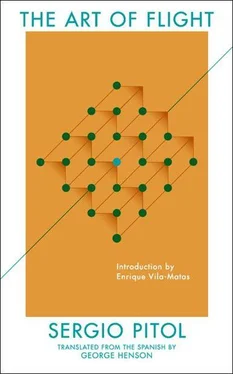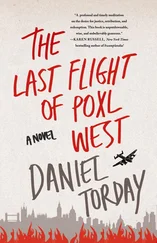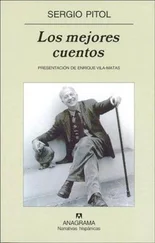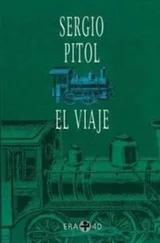By then, I had already read The Gates of Paradise and recommended the book to several Spanish-language publishers. One day a contract arrived with instructions to give it to the author for his signature. I phoned him and we met at noon at the Bristol’s café—a neutral time, devoid of tertulias or extravagant characters. It seemed to surprise him that one of his novels — and particularly that one! — was going to be published in Mexico, a country he did not know except for a few characters and episodes from the revolution and those from the movies. It was the first time I talked to him alone. He received my enthusiastic comments about his novel with skepticism, as if it were a joke he had to tolerate. He lashed out incessantly at the limitations of the Poles, but at the same time — and to my surprise — he related the value of every literary work to the circumstances of his country, its historical tragedies, its bloody past and mediocre present, which seemed to me to be a more sophisticated and slightly comical form of nationalism. When he was convinced that I knew the authors, that I had translated Conrad, and that I was obsessed with Mann, everything changed. During the following weeks we meet four or five times to solve some problems of translation; during our short breaks, I asked him about Polish writers. Usually, when I mentioned the name of an author he would make a gesture with his hand as if shooing a fly and mutter: “His brain is smaller than a flea’s,” or “Let’s not waste time talking about that idiot.” He respected Bruno Schulz greatly. It is strange, but I cannot recall a single opinion about Gombrowicz, whom out of necessity we must have talked about. Although at midday we talked about literature, when I met him later in a nightclub on Foksal Street, the subject was completely different. Even in lighthearted moments he was stern, even theoretical. What I know is that during our daytime sessions, as well as our informal evening encounters, he always erected an invisible wall around the table, seemingly by his own choice, beyond which the world ceased to exist.
After translating The Gates of Paradise , someone handed me Czeslaw Milosz’s The Captive Mind . When I finished reading it, I had the feeling that someone had just given me an inexplicable beating. I found it inconceivable that the exiled poet had been able to incorporate into his book such a hurtful and offensive biography of a writer whom the best Poles considered a paradigm of national dignity. The fact that Milosz would begin this text by recounting an intimate childhood friendship, almost a brotherhood, and would recount some of the most heinous moments shared during the German occupation, as well as after, seemed to make the insult more powerful. It was like someone’s boasting of having stabbed someone in the back, only later to reveal flippantly that the dead man was his own brother. The Captive Mind appeared in the U.S. in 1951 during the harshest moments of the Cold War, and, as always with a political book written with honesty, it irritated both the left and right. It was in no way a mere political pamphlet but an autobiographical account that included an infinite number of nuances, that tried to explain to the foreign reader the complex knot of passions and experiences that made the history of his country something very different from that of other European nations. It was not about a world of absolute good and evil but the result of circumstances inherited over centuries, a feverish world, strained by history. When Milosz received the Nobel Prize, he made one of his first trips to Poland after a thirty-year absence. There was an emotionally charged event during which the poet read his work. In the front row sat Andrzejewski. They were, apparently, no longer enemy brothers.
Shortly before beginning these pages, I reread The Captive Mind and found it remarkable; the immense changes in Poland, unthinkable during the period in which Milosz wrote, put many things into perspective and clarified others. There is a passion evident in the book not too different from that experienced during a civil war: discovering that a brother has gone to the opposing camp is an affront that cannot be forgiven, the wound that takes longest to heal, many threads become entangled at once, very delicate tapestries move in an unpredictable way, stage by stage, the brother’s past conduct is examined, and in each of them grounds for reproof are found, an unbearable tension is reached until a trigger, any trigger, produces the explosion. Milosz alludes repeatedly to the extraordinary pride and unbearable arrogance with which Andrzejewski carried himself; he recognizes his almost suicidal activity and value of his work during the darkest years of the German occupation, but forever regrets the major role such activity disguised; he even goes so far as to reproach him for being so perfect during the terrible years when life was constantly at stake. He finds that same organizational drive, that is, leadership, during the period of Communist militancy. He minimizes the quality of Ashes and Diamonds , which he points to as a sample of ideological literature, about which he is mistaken.
Surely Andrzejewski must have been insufferable, both in his role as Catholic intellectual and as well as that of Communist writer. We now know that these events are only a fragment of a longer history that was far from being finished when The Captive Mind appeared. Everything that followed exacted a heavy price. Renouncing with a minute handful of writers his membership in the Communist Party in protest of the Russian military occupation in Hungary in 1956 was not a joking matter. A decision of that caliber in a country where the Party was in power, and doing so during those years, had something of the unreal and much of the truly heroic about it. One left the Party by death or expulsion, and it is well known what was meant by expulsion. Writing and publishing the literature that Andrzejewski produced thereafter also exacted an enormous toll. It is possible that his personal liberation, and his decision not to make concessions, was based on the fiendish pride that was the most visible characteristic of his personality. Perhaps, deep down, driven by some earlier religious zeal, he would have liked to have been a martyr and to have died as such. He did not. He managed instead to leave behind perfect pages, of which The Gates of Paradise is perhaps the clearest proof.
When the Polish author spoke in the Bristol’s café of the great literary challenges and the desire to achieve the greatest possible form as a maximum virtue, I thought of The Gates of Paradise. The difficulties involved were immense. To begin with, the novel consists of only two single sentences, the first consisting of one hundred and fifty pages; the other, just five words.
And in that first never-ending sentence weaves a complex and dark story in which, unhindered by a single period to fragment it, the confessions of the five adolescents who lead this illusory crusade become intermingled, a crusade that will never succeed in reaching the gates of Jerusalem and that will not even get close to them. It has been thirty years since I translated this enigmatic book whose center seems to shift at every moment. I was afraid that it had aged. Not so, its poetics has weathered time perfectly, and its meaning, in spite of how explicit its confessions seem, seems even more secretive now. We come to know in great detail the love story of each of the adolescents who appear partially and piecemeal during the general confession by an insistent iterative exercise. We come to know the dramas that darken their lives, but could that be the goal of the story? Or did the author simply create a particularly refined style and a purely formal architecture for the pleasure of experiencing new narrative processes? Those questions distract us in order to keep the novel’s very center hidden and wrapped in armor, to the point of preventing us from knowing with absolute certainly in which section it is located.
Читать дальше












